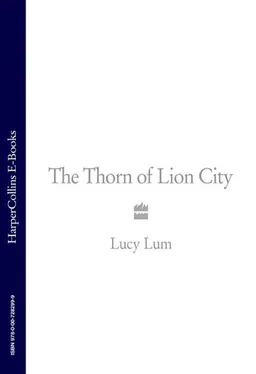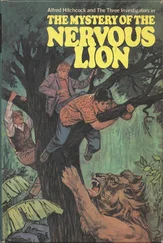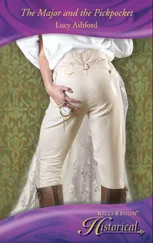‘No. You will not be returning here. This is no longer your home.’
Fat Lum went into the bedroom. When he came back, he had with him a pile of documents that proved the plantation had been transferred to him.
‘My mother would never have signed those papers if she had been able to read English,’ said Father.
It was no use. ‘Take your wife and baby and leave. Your mother is dead. We no longer have any family connection,’ said Fat Lum. ‘Furthermore, the monthly allowance for your education will be discontinued.’
Father told me that he, Chiew-wah and little Beng went to live with Popo, my mother’s mother, in her flat in Chinatown – where I can remember living as a small child. There, Mother gave birth to her second child, my older sister Miew-kin; the nurses thought it a good omen that she was born on the sixth birthday of the elder daughter of the King and Queen of England. Popo was a devout believer in Chinese astrology: ‘A birthdate that coincides with a royal child cannot be more auspicious for your daughter,’ she said to my mother. For once Popo thought an astrological consultation unnecessary. ‘What better news can the astrologer forecast?’
When Father talked to me under the table about Popo he would lower his voice to a whisper. She did not like him telling us about those years. I would peep round the mattresses to make sure she was not listening to the stories Father was telling me.
Father explained that Popo paid for my mother’s stay in the maternity hospital, and when Mother came home, Popo employed a pue yuet , an attendant for the first month. Every day my mother was washed with towels dipped in hot water in which a mixture of lemon grass, pomelo leaves and ginger roots had simmered for an hour. She had to eat special foods to chase away the wind that enters the body after childbirth: ginger roots, dark brown sugar and black Chinese vinegar were heated, then left to mature in great earthenware pots; later, pigs’ trotters were added to the mixture, cooked, and served to Mother at every mealtime for four weeks. She was made to drink tea made from roasted ginger roots and boiled black beans, which, Popo said, would prevent arthritis in old age.
The pue yuet was the best in the area and Popo paid her well to look after Mother. She spared no expense. Father was not yet working and had no money, so Popo did not consult him. When my sister was born she treated him like a bystander. He offered to care for Beng while my mother nursed the new baby, but Popo would take Beng from him, saying, ‘Go away. This is not a man’s work.’ Then she would mock, ‘Poh-mun, how can you stare at books all day and night when you have two children to care for? You should leave school now and find a job.’ But Father had no intention of abandoning his studies after all the sacrifices his mother had made, so he buried himself in his books and let Popo take control of his family.
A year later, just before I was born, he passed his final examinations and found a job as an interpreter. He told me how glad he was to have fulfilled his mother’s dream that he would not become a farmer, and how proud he was to be earning money for his family at last.
My grandmother wasted no time in reminding him of what he owed her. ‘You are in my debt for life,’ she told him, ‘and you can never finish repaying me. I took pity on my daughter and grandson. I did not do it for you.’
Father told me that she had worn him down with her insults and demands, and that he had surrendered his first pay packet to her. When he talked about these years I could tell from his voice how sad he was, and tired, and I was afraid of the Japanese bombs coming down on my head, through the ceiling and the mattresses and the thick teak table.
Four
I was the third child and Popo gave me my name. On the day I was born, 19 December 1933, she consulted with an astrologer and chose the name Miew-yong, Subtle Lotus.
I slipped out of my mother in the blink of an eye at the maternity hospital close to Serangoon Road, where the air was thick with spices from the shops where they were milled, and people queued on the pavement, clutching their precious bags of turmeric, cardamom and cumin, grown on their plots of land and brought to the shops for grinding. As they waited their turn patiently, they watched the women squatting over enamel basins of buds and flowers that they threaded deftly into delicate hair ornaments. Undulating rows of floral garlands were draped over poles, the sacred star-shaped champaca among the sweet-scented blooms. Next to the milling shops, goldsmiths sold exquisite jewellery, and fabric merchants displayed layer upon layer of sarees in a tangle of colours. Along the road, tucked away, tiny restaurants served curries, sweetmeats and yoghurt on banana leaves cut into squares.
We lived in Chinatown until I was five. Popo’s flat was on the first floor of a three-storey building on a busy tram route, which cut across Chinatown towards Geylang, above a little coffee shop in Tanjong Pagar Road. The flat was divided into small rooms and cubicles, and Father and Mother, Beng, Miew-kin and I had a tiny room at the front. The overhead tram cables hummed a few feet from our window, and as I stood looking out on life in the street below, the trams lumbered by, shooting sparks. How easy it would be, I thought, to touch the cable with Popo’s rattan cane. Aunt Chiew-foong, my mother’s younger sister, lived in the next room; she had a sewing-machine that she pedalled all day long. Popo and Kung-kung, my grandfather, lived at the back and the three windowless cubicles in the middle of the flat were let, as was the space under the stairs.
To reach the flat we climbed a dark staircase to the large landing area with an altar and the table at which we had our meals. The walls around the altar were sooty with the smoke from the hundreds of joss sticks my family and the tenants had burnt. The flat was gloomy: Kung-kung insisted on fifteen-watt bulbs to save money, but on his birthday he replaced them with sixty watts and, for that day, the flat was flooded with light. In the kitchen there were charcoal stoves for cooking, and in the bathroom a big tub for washing and a toilet, the bowl stained black with age.
Outside, the street was always busy. Workers went to and from the tobacco factory, women struggled with bags of food from the market, hawkers called their wares, and at the tea-shop opposite people met, talked and laughed. I would stand at the window and watch all this for hours, and when I grew bored I would go outside on to the pavement by the door to our flat. Sometimes I would venture further with my father, or one of the tenants, past the tall, terraced buildings with brightly painted shutters and through the tangled streets lined with shops and stalls selling glistening fish, steaming bowls of noodles, cloth of every colour, pots, pans, and songbirds in cages. Sometimes I would be taken to the temple in the heart of Chinatown where my grandmother went to gossip and exchange news with her friends, or to my grandfather Kung-kung’s herb stall, where he spent his days telling customers how to treat their ailments and selling them the remedies they needed.
At home Popo would spend hours talking with her chimui , sitting in the kitchen as the trams rattled by outside. The chimui were her closest friends, her ‘foster sisters’, and many owned herb shops. Together, they discussed ailments, symptoms and remedies, but they also liked to talk about the past. When she was in a good mood Popo loved to tell her story, and sometimes Miew-kin and I would sit quietly by the women and listen to her talk. We never interrupted: we were careful not to do that.
Kung-kung and Popo had been born in a village in Canton, she said, the capital of Kwantung Province; they married when she was nineteen and he twenty-one. Popo would tell her chimui of how she had left her village for Hong Kong in 1911, the year of the Canton uprising, with her husband and his family. They had set up a herb shop in Nine Dragons, and when they had settled in, Popo’s mother-in-law had decided to leave her share of the work to Popo. That was how Popo had gained her wide knowledge of medicinal leaves, fruit and roots, and how to use them to treat all sorts of ailments.
Читать дальше












